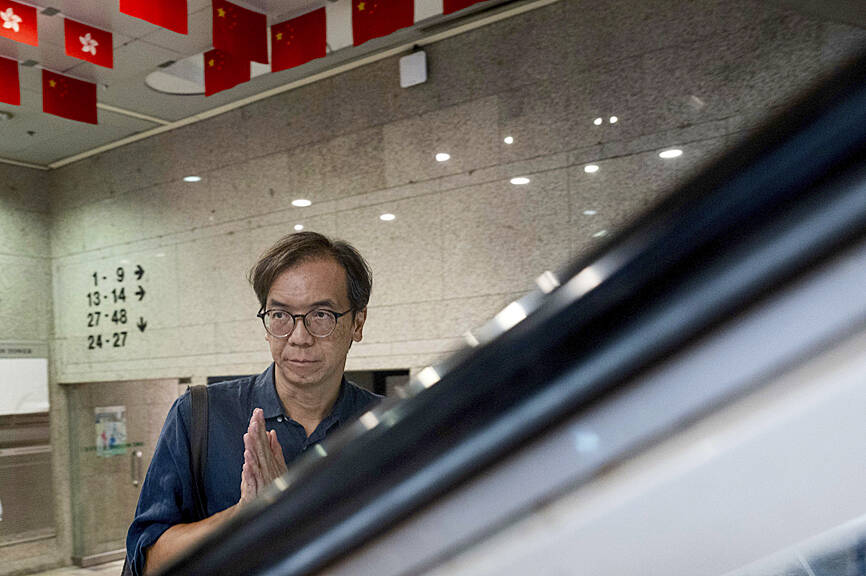Hannah Wong cried when the Hong Kong government effectively forced the territory’s Apple Daily and Stand News out of business three years ago. Among the last news firms in the territory willing to criticize the government openly, many saw their end as a sign that the old Hong Kong was gone for good.
Today, the 35-year-old makeup artist says she has gone from reading the news every day to reducing her intake drastically to protect herself from despair.
Four years into a crackdown on dissent that has swept up democracy-leaning journalists, rights advocates and politicians in the territory, a lot of people are tuning out the news. It is a striking sign of change in a place that used to pulse with talk, from morning conversations over newspapers in bustling dim sum restaurants, to lively debates on social media throughout the day, to evening discussions at dinner tables.

Photo: AP
Wong says it is too hard to read the headlines, but avoiding them left her feeling more disconnected.
“There’s a loss of the sense of belonging to this place,” she said.
Since Beijing imposed a national security law in 2020, press freedom has narrowed.
In 2021, Apple Daily and Stand News closed down after the arrests of their top management. Hong Kong was ranked 135 out of 180 territories in Reporters Without Borders’ latest World Press Freedom Index, down from 80 in 2021.
On Thursday, two former editors of Stand News were convicted in the first sedition case involving media since the former British colony returned to China’s rule in 1997. The judge said their company became a tool for smearing the Beijing and Hong Kong governments during protests in 2019.
After the verdict, the Hong Kong government said that when journalists base their reporting on facts, there are no restrictions on press freedom.
Politics is one factor driving news avoidance, said Francis Lee (李立?), a professor of journalism and communication at the Chinese University of Hong Kong.
Early last year, a survey conducted by Lee’s team at the Center for Communication and Public Opinion Survey found that about four in 10 Cantonese-speaking adults in Hong Kong agreed or strongly agreed that they sometimes want to avoid news about the changing social or political environment in Hong Kong.
People who do not trust the government are more likely to tune out the news, such as democracy supporters who tend to view the territory’s recent changes negatively, Lee said.
When people perceive the news firms as unable to perform, they are also more inclined to avoid news, he said.

EUROPEAN FUTURE? Albanian Prime Minister Edi Rama says only he could secure EU membership, but challenges remain in dealing with corruption and a brain drain Albanian Prime Minister Edi Rama seeks to win an unprecedented fourth term, pledging to finally take the country into the EU and turn it into a hot tourist destination with some help from the Trump family. The artist-turned-politician has been pitching Albania as a trendy coastal destination, which has helped to drive up tourism arrivals to a record 11 million last year. US President Donald Trump’s son-in-law, Jared Kushner, also joined in the rush, pledging to invest US$1.4 billion to turn a largely deserted island into a luxurious getaway. Rama is expected to win another term after yesterday’s vote. The vote would

FRAUD ALLEGED: The leader of an opposition alliance made allegations of electoral irregularities and called for a protest in Tirana as European leaders are to meet Albanian Prime Minister Edi Rama’s Socialist Party scored a large victory in parliamentary elections, securing him his fourth term, official results showed late on Tuesday. The Socialist Party won 52.1 percent of the vote on Sunday compared with 34.2 percent for an alliance of opposition parties led by his main rival Sali Berisha, according to results released by the Albanian Central Election Commission. Diaspora votes have yet to be counted, but according to initial results, Rama was also leading there. According to projections, the Socialist Party could have more lawmakers than in 2021 elections. At the time, it won 74 seats in the

CANCER: Jose Mujica earned the moniker ‘world’s poorest president’ for giving away much of his salary and living a simple life on his farm, with his wife and dog Tributes poured in on Tuesday from across Latin America following the death of former Uruguayan president Jose “Pepe” Mujica, an ex-guerrilla fighter revered by the left for his humility and progressive politics. He was 89. Mujica, who spent a dozen years behind bars for revolutionary activity, lost his battle against cancer after announcing in January that the disease had spread and he would stop treatment. “With deep sorrow, we announce the passing of our comrade Pepe Mujica. President, activist, guide and leader. We will miss you greatly, old friend,” Uruguayan President Yamandu Orsi wrote on X. “Pepe, eternal,” a cyclist shouted out minutes later,

Myanmar’s junta chief met Chinese President Xi Jinping (習近平) for the first time since seizing power, state media reported yesterday, the highest-level meeting with a key ally for the internationally sanctioned military leader. Senior General Min Aung Hlaing led a military coup in 2021, overthrowing Myanmar’s brief experiment with democracy and plunging the nation into civil war. In the four years since, his armed forces have battled dozens of ethnic armed groups and rebel militias — some with close links to China — opposed to its rule. The conflict has seen Min Aung Hlaing draw condemnation from rights groups and pursued by the